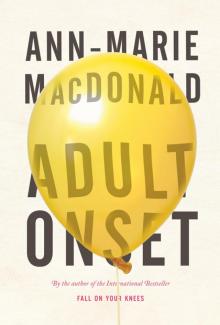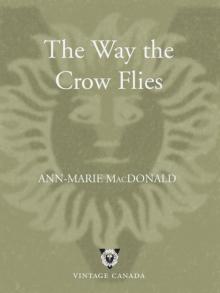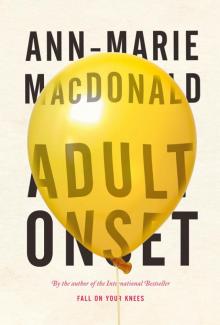- Home
- Ann-Marie MacDonald
The Way the Crow Flies Page 35
The Way the Crow Flies Read online
Page 35
As Colleen and Madeleine linger, however, a couple of other dads arrive and smile openly, wanting to know the whole story. They have a look in their eyes that Madeleine has seen on television shows—the look just before the wolf whistle at the pretty girl walking down the street. Philip’s father keeps working and more or less ignores the other men. He tells the story briefly, quietly, accepting a beer almost as an afterthought. “Son of a gun!” they say and gaze at the deer. “She’s a beauty, Harve.” Philip is grinning in a strange way, fetching things for his dad. He picks up the pail of guts, pretend-vomits into it and offers it to Madeleine and Colleen.
“Philip,” his dad warns softly. Philip puts the bucket down and looks up at his father, who has begun to chop meat off the deer. “Are you giving me a hand or are you playing with the girls?”
Philip turns red and proceeds to ignore Madeleine and Colleen. So do all the other men and boys—there are no women out here now that it’s getting dark. The sky is sad and beautiful, stained orange where the sun splashed down. Someone’s hi-fi is playing, music drifts from a window two or three doors away, “Bali Hai” is calling….
Arnold Pinder is up in the tree now, with an extension cord, positioning a light bulb over the deer. The men have forgotten that Madeleine and Colleen are present. Spying.
Madeleine knows that no girls are allowed here. No women either. They will cook the meat and serve it, but it is not decent for females to be out here. Not because of the hacked-up deer—they’re taking off its head now—“Hang on. Got it, okay…. Weighs a ton”—but in the way it’s not decent for an older girl or a woman to go into a barbershop. Never mind a tavern. Those are men’s places. Madeleine knows that her days of accompanying her father to the barber are numbered. This backyard has become a men’s place.
They let out a short whoop as they cut down what’s left of the deer, take the weight and lay it on a tarp. Philip’s dad leans over the carcass with a hacksaw. The girls can’t see past the men and boys, gathered and relaxed now around the tarp with beers and Cokes, but they see Arnold Pinder come around the side of the house. He’s got his dog, Buddy, by the collar, and Buddy is practically walking on his hind legs, pulling Arnold toward the tarp. Mr. Pinder straightens up and tosses a stick to Buddy, who lunges and carries it off. It is not a stick, it’s a leg.
Madeleine pokes Colleen, but Colleen just shrugs. Madeleine knows that deer was murdered. But Colleen would never say that. She rarely gives her opinion—even though it is clear to Madeleine that she always has one. Not just an opinion, but the right answer. Trouble is, she refuses to say it. “If you don’t know, what’s the use of me telling you?”
“That’s a stupid answer,” Madeleine recently got up the nerve to say.
To which Colleen raised her eyebrows and smiled slightly with a corner of her mouth.
Colleen can fire a neat and tidy round of spit off the tip of her tongue. She does this after she has given an opinion, silent or otherwise. She does so now, and says, “My brother shot a deer once.”
For a moment Madeleine wonders who Colleen means, because the images of Ricky Froelich and shooting a deer don’t go together.
“Ricky?”
“How many brothers do I got?”
Madeleine knows that Roger and Carl don’t count. They’re babies.
She swallows. “How come?” Colleen doesn’t answer. Madeleine asks, “For food?”
Colleen has risen and is walking off. Madeleine follows. They slip into the chill of deeper shadows, up the gentle incline through grass that has begun to feel sinewy underfoot with the coming of frost.
She follows Colleen to where the monkey bars and merry-go-round glint glamorous and strange in the night. Through the gloom, the bare patch in the oak tree glows white, and she reaches out to stroke the wound as she passes—Get well soon.
The darkness makes the swings look bigger—giant metal A’s at either end supporting gallows in between. The teeter-totters tilt astride their hitching post like bucking broncos, the slide gleams sly and skinny, everything says, “I dare you.” Madeleine experiences a thrill at the lateness of the hour, only now realizing that she has stayed out long past when she is allowed. Her parents must have left by now for the Woodleys’. She lost track of time, what with the sunset and the electric light in the tree, the music, the men, the boys. And the deer.
“He had to shoot it,” says Colleen, walking up the teeter-totter till she is balanced at the centre.
Madeleine follows. “Why?”
“It was suffering.”
They stand back to back at the fulcrum of the teeter-totter and walk slowly toward opposite ends, as though about to fight a duel, trying to keep the board perfectly stable. Then they turn carefully and face one another. The object is to jump off with no warning, causing your opponent, should she not be quick enough, to come crashing down. They take turns. The darkness shines around them. The only light is from the houses and street lamps beyond—and from a wedge of moon that looks more remote than ever in the black sky. Certain questions may now be asked that would be impermissible during the day. Madeleine hears her own voice in the cold clarity of night—like the sound of a rifle being broken open. “Are you guys Indian?”
Colleen appears not to have heard the question. She stands at her end.
Madeleine swallows and says, “I don’t care if you are, ’cause anyhow I like Indians.” She cannot read Colleen’s expression. Her skin is darker, blue eyes paler in the night.
Colleen says, “We’re Métis.”
Madeleine waits for more but Colleen is silent, watching her. Playing the game.
“What’s that?”
“You know what a half-breed is?”
Madeleine nods.
Colleen says, “Don’t ever use that word.”
Madeleine waits.
“Ever hear of Louis Riel?”
Madeleine shakes her head.
“He was a rebel. He fought the settlers.”
“What happened to him?”
“He got hanged.”
Madeleine is poised with the keen anticipation of a hunter, or a deer, about to jump—
“Dieu merci!”
She turns at the sound of her mother just as Colleen jumps, sending her slamming to the ground, but she doesn’t yelp. She is instantly caught up in a tight embrace. She feels her mother’s chest, soft and cushiony, heart pounding beneath silk, she smells hairspray and perfume. The next instant, she is swung out at arm’s length, spun round, whacked on her bottom and yanked by the hand toward home. Her mother crying and promising Madeleine “a good beating from ton père”—an empty threat, as Madeleine well knows, but one that gauges the degree of her mother’s upset—“sick with worry!” Her ivory high heels sink into the earth with every step, spearing little clumps of mud and grass.
They reach the sidewalk and she turns to look back but Colleen is gone.
Five days later the weather has changed. Flurries in the morning. Thick flakes have swirled outside the windows of J. A. D. McCurdy all day, and in the afternoon a dark cloud moved in and the wind picked up. The snow blows like sand across the schoolyard and gathers in miniature dunes against the slide, the pitcher’s mound, the bicycle racks and car tires. The class makes snowflakes in art. Take a piece of white construction paper; fold it neatly in two; draw one half of a snowflake; cut it out, then carefully poke the sharp end of the scissors through to make numerous tiny holes; unfold the paper. Miraculous.
The first snow is always a surprise. It comes overnight, and in the morning parents wake their children, “Come look out the window!” It covers everything—trees, houses, backyards and bikes. It brings everything and everyone together, even sounds—a fresh white muted world where the roll of tires is intimate, every whisper and bird call part of the same story. Houses and cars peer out from beneath white coverlets that pleat at eaves and headlights, and trickle into icicles. Across the lawns, now just one great lawn, curves and contours take shape, mysterious sudden
swellings.
After breakfast, kids put on snowsuits and toques; padded oblong figures with penguin arms tread out into the winter sunshine, eagerly yet regretfully making the first marks. The birds have been there before them with their three-pronged prints, but otherwise the snow is pristine. Soon it will be pitted and dirty, rolled into snowmen, piled into snow forts, swished into angels, the grass exposed in patches and green slashes. There is the particular scent of soil filtered through the damp wool of scarves beaded with breathcicles, the taste of snow on woollen mittens.
By afternoon, steam rises from shining black driveways, the last white slabs slide heavily from a mailbox, a porch railing. Overheated children unzip as they swaddle home, galoshes unbuckled, hats in hand.
“This will confuse the birds,” says a lady at the PX, where Jack is buying charcoal. The McCarthys are having a barbecue tonight. “The last one of the season,” says Jack.
It is a mild evening. And although Madeleine is embarrassed to be the only family barbecuing in the shrinking snow, the chicken does smell irresistible turning on the rotisserie just outside the back door. The way her parents behave whenever they do some crazy thing like this compounds her mortification and completes her happiness. Her mother laughing unaccountably, her father winking back; Maman slipping her arms around his waist from behind, the way she does whenever he cooks or does something that is usually women’s work. He boasts that all the great chefs of the world are men, and she bites his earlobe. Madeleine and Mike exchange looks, rolling their eyes.
HOUSECALLS
One day Willie writes a note to the milkman, and is alarmed to read what she has written: the single word ‘Help.’
TV Guide promo for The Trapped Housewife, with Michael Kane as “the Voice of the Doctor,” 1962
JACK HAS BEGUN to feel rather like a chauffeur. “Errand boy” is too negative a term, especially considering that he is Oskar Fried’s only contact. But it would help if the man were more forthcoming. Jack has put miles on the Rambler. Even in the city. Fried will not walk anywhere and he will not take a cab. He has done his best to badger Jack into allowing him to take the wheel, but Jack is not about to let Fried drive without a licence—what if they were stopped by the police?
Driving is conducive to conversation, but Fried rarely speaks. Jack endures his silent profile across the monotonous miles … Niagara Falls, the Botanical Gardens, the greenhouse at Storybook Gardens; an outing one or two afternoons a week, even dinner and a Leafs game in Toronto one night—he told Mimi he was at a function at the university. Tim Horton was in fine form and Gordie Howe at the top of his game; it might have been fun, but Fried is a dull date and Jack wished bitterly that he were there with his son instead. He provided play-by-play commentary worthy of Dick Irvin, while Fried watched his first hockey game with the rapt attention of an iguana. It was impossible to know whether or not he was enjoying himself. On the drive back to London, Fried said, “I keep this car.” “I beg your pardon?” “You borrow this car to me.” “No sir, I’m sorry.” And Fried’s silence deepened.
Fried puts away a bottle of wine, tucks into a New York strip, but nothing loosens his tongue. Jack picks up the tab—Fried seems not to carry money. And he never fails to place his grocery order over the phone, so that Jack invariably arrives at the apartment laden with bags. Cognac, fresh pouch of tobacco … it adds up.
Simon has reimbursed him, but Jack was faced with a short-term quandary that Simon could not have foreseen: Jack’s salary is deposited directly into the bank by the station accounts officer, and he and Mimi have a joint account. Not every married couple has one but every true partnership does, and that’s what Jack and Mimi have. For Jack to spend close to a hundred unaccounted-for dollars would raise a question in Mimi’s mind.
He got around this hitch by asking the flight lieutenant in the accounts office for an advance. Not unusual, not questioned. Not a problem. A week later Simon wired him the money, and Jack was able to deposit it in his bank on the same day as the rest of his pay. But when Mimi was reconciling the accounts two weeks later, at the dining-room table—he is the MBA, but she is the chief financial officer at home—she looked up and asked why there were two deposits on the same day adding up to his usual pay. He told her the accounts officer had made a mistake—shortchanged him by a hundred, then corrected it. She accepted that, and why should she not?
But it didn’t sit well with him.
When he came home from his first afternoon with Fried, he was speechless when his wife inquired over supper what he had been doing at Storybook Gardens. How did she know? Had she been in London? Had she seen him with Fried? He felt his face flush. She answered his question before he could ask. It turned out there was a wretched sticker on the rear bumper of his car. Black silhouette of a castle turret against a bright yellow background. He hadn’t noticed it when he returned to the parking lot, having waited while Fried stood silently, endlessly, before a series of potted plants in the greenhouse. He told Mimi he had grabbed a sandwich and gone there to stretch his legs between meetings. She didn’t question him, and her subsequent behaviour betrayed no suspicion. And why would she be suspicious?
Yet Jack is annoyed to have felt himself squirm guiltily at his own supper table. It didn’t feel like a “tactical” lie, it simply felt … shabby. He’s angry at Oskar Fried for steadfastly refusing to visit his home, to get over the clandestine nonsense and meet his family under a plausible and congenial cover so that Jack can reasonably be seen to be helping the man out from time to time. To “normalize relations.” He has considered confiding in Mimi but that would mean clearing it with Simon first, and he’d feel like a damn fool asking Simon permission to tell his wife because he’s feeling like a sneaky schoolboy. And Mimi should not have to worry about a Soviet defector on the run from the KGB—not after what they’ve all just been through with Cuba.
He has drawn the line at weekends and his work isn’t suffering, but he missed his son’s first hockey game of the season. When he went to Winnipeg for his meeting with the AOC of Training Command, he was relieved—four whole days without a call from Fried. Without a grocery list, or a lie. He was no one’s servant. No one’s chauffeur.
Scientists are supposed to be curious. Fried has not asked Jack a single question about his work or life in North America, beyond bare utilitarian queries. Jack feels invisible. He reflects on the brief paragraph he read about scientific employees. Non-social, non-participative. He has begun to smell something unpleasant in Fried’s manner. What at first seemed like fear has resolved into something resembling arrogance. Perhaps it’s mere resentment or frustration at having spent so many years in grinding servitude to the Soviet system. Perhaps the poor bastard is incapable of happiness. Jack reminds himself that Fried is a rocket scientist, not a candidate for Miss Congeniality.
But if only he would talk about bloody rockets, even in the most general terms. Jack asked him about USAF but all Fried said was, “I prefer NASA.” Jack was momentarily uplifted—here was a scientist who dreamt of working with the civilian space agency, a purist with his heart set on sending a man to the moon because it was there. But that was short-lived. Jack couldn’t pry another word from him on the subject. When Simon told him that he would be acting as a “housekeeping agent,” Jack had not realized he meant it literally. What did you do in the Cold War, Daddy? I delivered groceries.
Throughout November, Jack juggles family, work, and Fried on the side. He begins to tire, not so much from the activity as from the petty lies. They leave a residue. When Mimi massages the back of his neck out of sympathy for his extra workload in the evenings, he is unable to give in to her soothing touch. Again he feels vaguely guilty. Yet it’s not as though he’s transgressing in any way—not as though he’s having an affair. Still, he is aware of fulfilling every condition necessary for the conduct of an affair—all the trouble and none of the perks. That last thought is unworthy of him, and he resents its intrusion.
Being as adept an observ
er of his own behaviour as he is of others’, he is aware that his thought process has changed. He knows he is creating grooves and patterns, pathways of deceit that he has sworn to use once only and only for this purpose—yet the pathways will remain. How long before they are grown over with grass and disappear? He shrugs it off by diagnosing himself as perfectly healthy. A normal man with a decent conscience. He simply does not enjoy lying to his wife.
Finally Jack hits on a partial solution: television. He tells Simon that Fried could use one, if only to improve his English, not to mention mitigate the loneliness. He doesn’t mention that Fried seems as self-sufficient as his orchids—except in the area of transport. Simon wires the money and Jack delivers a new RCA Victor to Fried, who carefully untwines an orchid from the rabbit ears. Jack leaves him watching The Beverly Hillbillies, as impassive as ever. “See ya, Oskar, call if you need anything.” Jack smiles to himself as he pulls the door closed. Fried has not even bothered to get up and slide the deadbolt behind him.
The phone rings after midnight. Mimi gets downstairs before he does. He asks who it was but she doesn’t know. “They hung up.” It rings again. Jack grabs it and tells Oskar Fried he has the wrong number. Then he tells his wife, “That’s it for me, I’m wide awake. Think I’ll stroll around the block.”
“At this hour?”
“Sure. Nice and peaceful.”
He pulls on his trousers and heads over to the station, breaking into a run once he has rounded the corner, and returns Fried’s call from the phone booth by the parade square.
Fried has called to tell him that there is something wrong with his new television set. A picture of an Indian has appeared and will not go away. Any other time, Jack would laugh. “It’s called a test pattern, Oskar. There will not be any more television programs until morning. Go to bed now.”
FRÖHLICHE WEIHNACHTEN
If an athlete gets athlete’s foot, what does an astronaut get? Missiletoe?

 Adult Onset
Adult Onset Belle Moral: A Natural History
Belle Moral: A Natural History The Way the Crow Flies
The Way the Crow Flies SSC (2012) Adult Onset
SSC (2012) Adult Onset